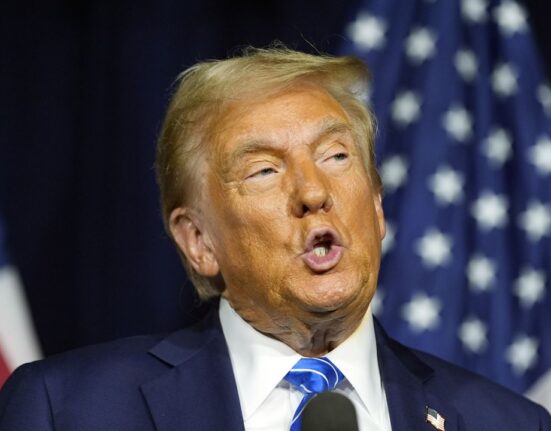Investors across the globe are on edge as America finds itself embroiled in a financial whirlwind that threatens to send shockwaves through the economy. The trade war initiated by President Trump has already left many investors reeling, and now they must brace themselves for the potential fallout from a looming spending megabill that could significantly inflate the federal deficit.
### A Rocky Road Ahead
With markets experiencing heightened volatility, concerns about the nation’s fiscal stability have reached a fever pitch. President Trump’s aggressive stance on international trade has kept global investors on edge, unsure of what lies ahead for America’s economic landscape. Meanwhile, congressional Republicans are deep in negotiations over a massive spending bill that could balloon the deficit by a staggering $3.3 trillion over the next decade.
### Political Maneuvering
In Washington, House Republicans, facing a delicate majority, are gearing up for a crucial floor vote on the budget bill. However, uncertainty looms large as the outcome hangs in the balance. President Trump is pulling out all the stops to rally support for the bill, knowing full well that his proposed tax cuts hinge on its successful passage. His upcoming visit to Capitol Hill serves as a clear indication of just how high-stakes this political gamble truly is.
### Market Jitters
The mere prospect of adding such substantial amounts to an already bloated federal deficit has sent shockwaves through traditionally stable sectors like U.S. government debt. What was once considered a safe haven for investors now feels like navigating a roller coaster ride of uncertainty and risk. Moody’s recent downgrade of America’s triple-A credit rating only added fuel to an already blazing fire.
Jim Reid
“Monday saw rapid sell-offs… after Moody’s cut America’s triple-A credit rating.”
### Global Fallout
Foreign investors seem increasingly hesitant to pour their money into U.S. assets amidst this financial turbulence. From dollar holdings to Treasury bonds and notes, there is an observable trend of international players shying away from American investments — dubbed as the “sell America” trade strategy.
### Analyst Insights
Market analysts are closely monitoring these developments with keen interest and growing concern. Observing recent market fluctuations, Jim Reid from Deutsche Bank noted how overseas investors might be stepping back while domestic counterparts ramp up their holdings in response to mounting uncertainties surrounding U.S. fiscal policies.
Torsten Slok
“Sustainability concerns may lead… erosion in value of U.S assets.”
Torsten Slok from Apollo Global Management echoes these sentiments, cautioning against unsustainable fiscal practices that could potentially drive up borrowing costs for households and businesses alike while simultaneously devaluing American assets such as government bonds.
As Wall Street remains fixated on unfolding events within the bond market and beyond, industry leaders including CEOs and economists continue ringing alarm bells about America’s precarious financial position — one that could have far-reaching implications if not addressed promptly.








Leave feedback about this